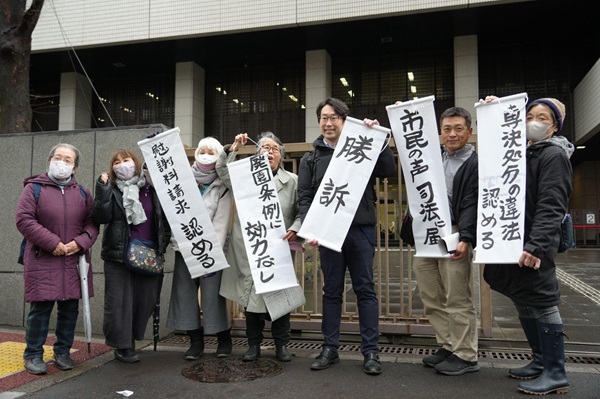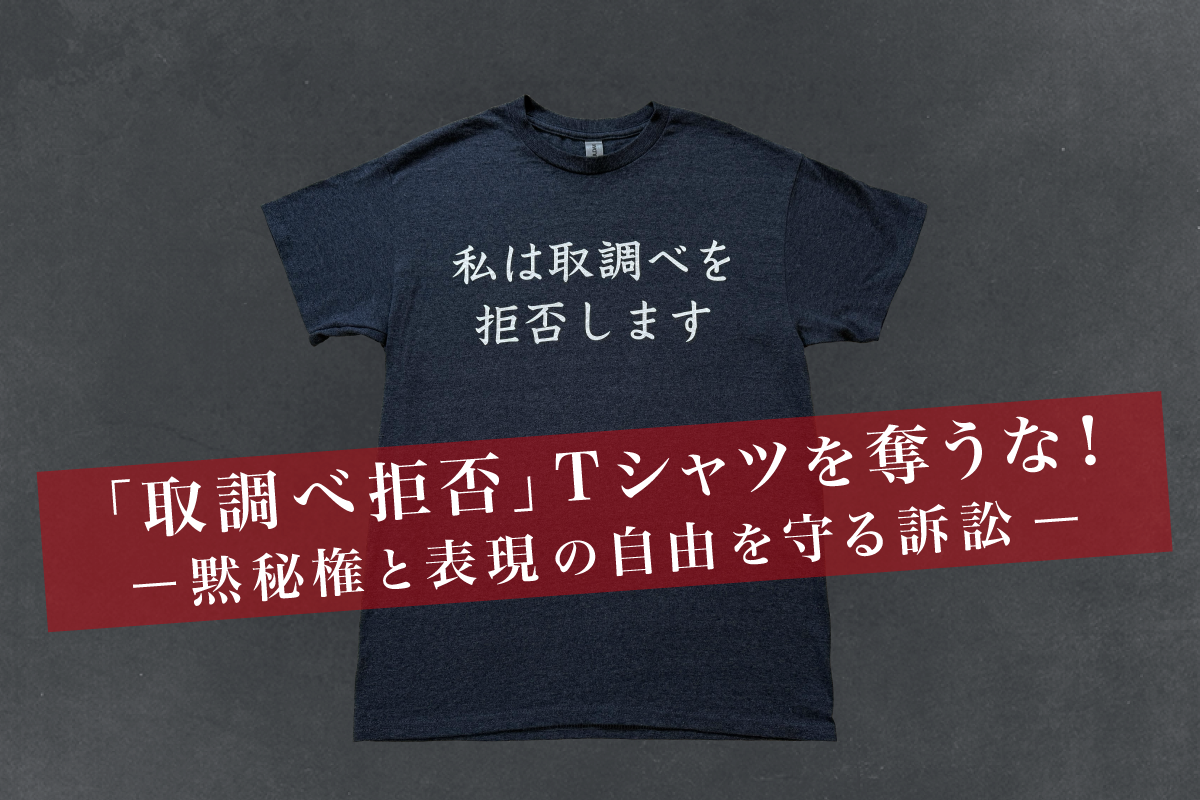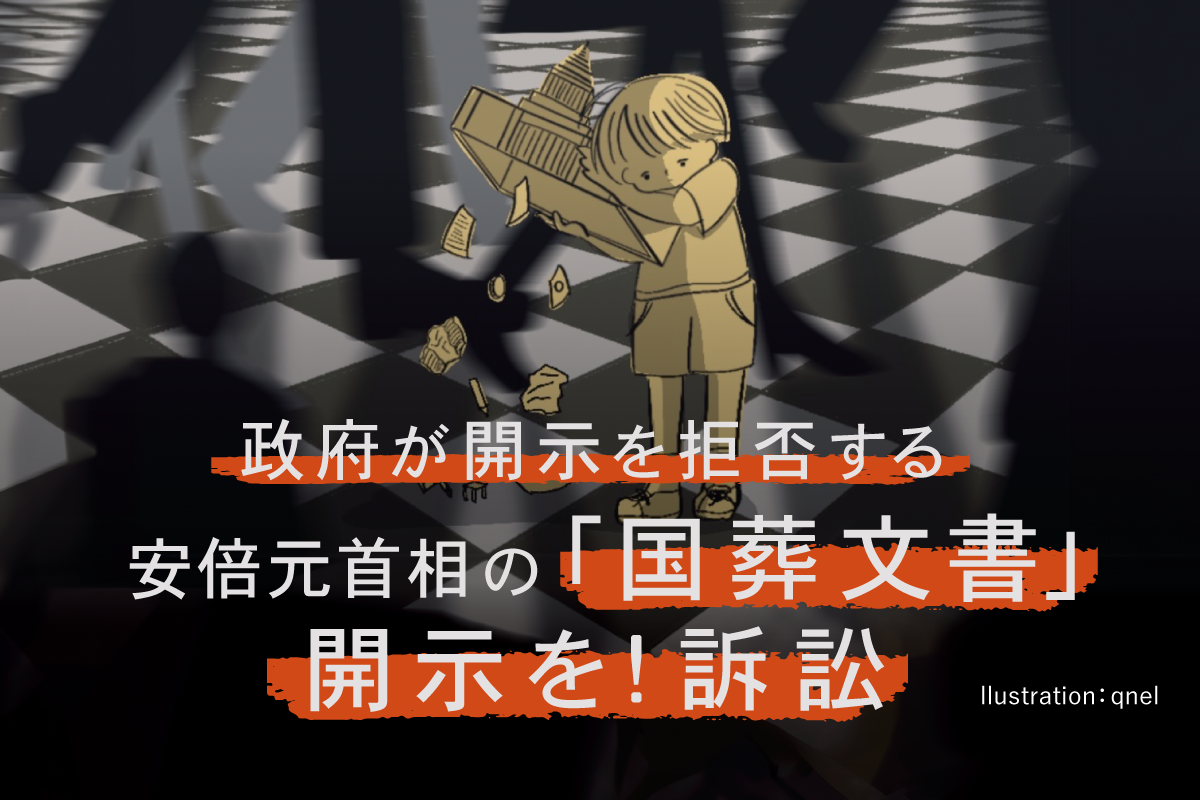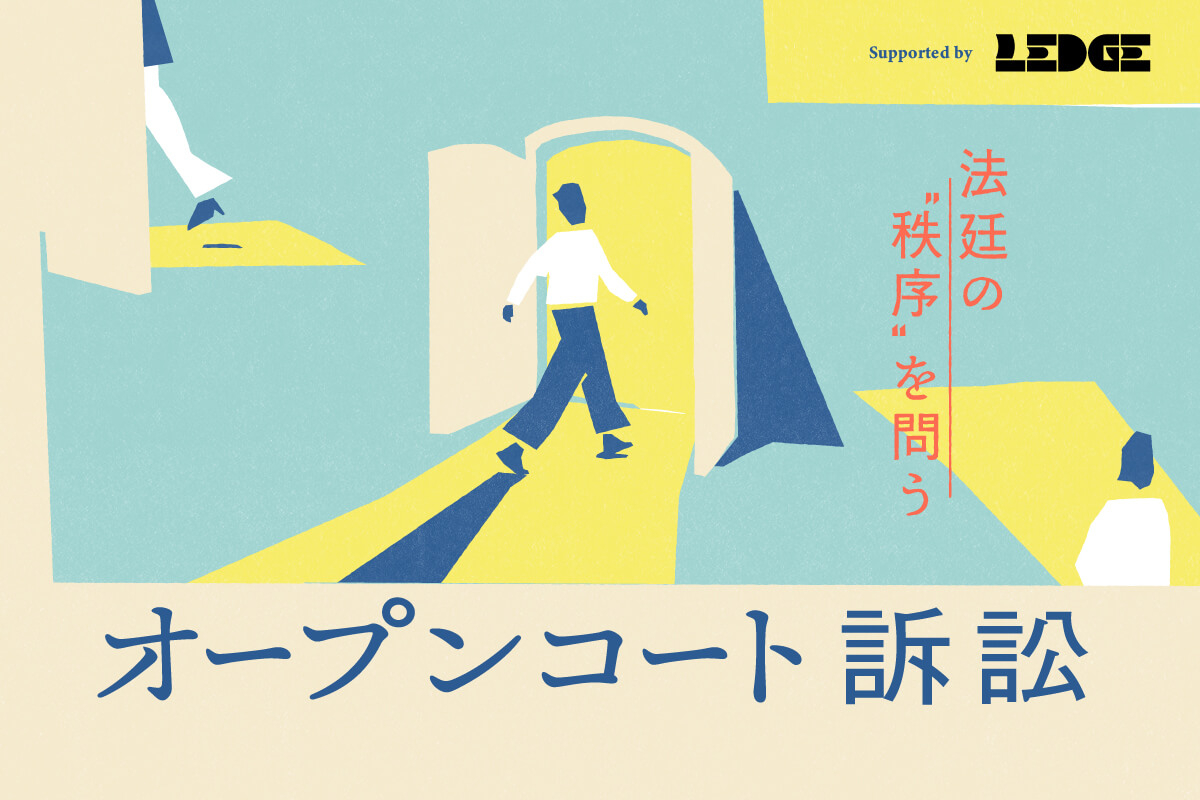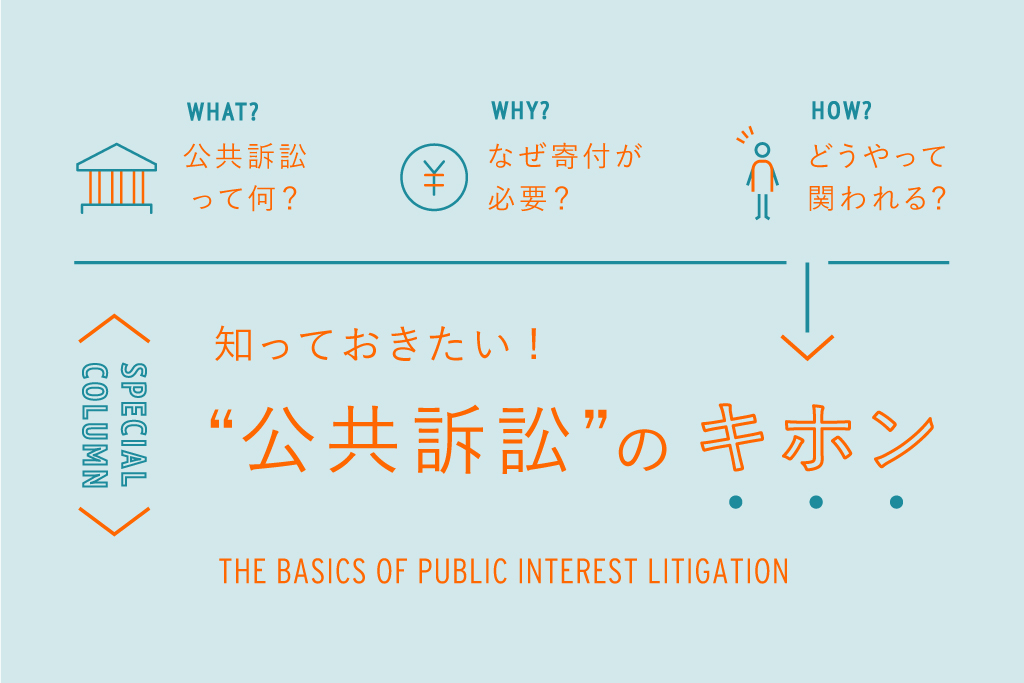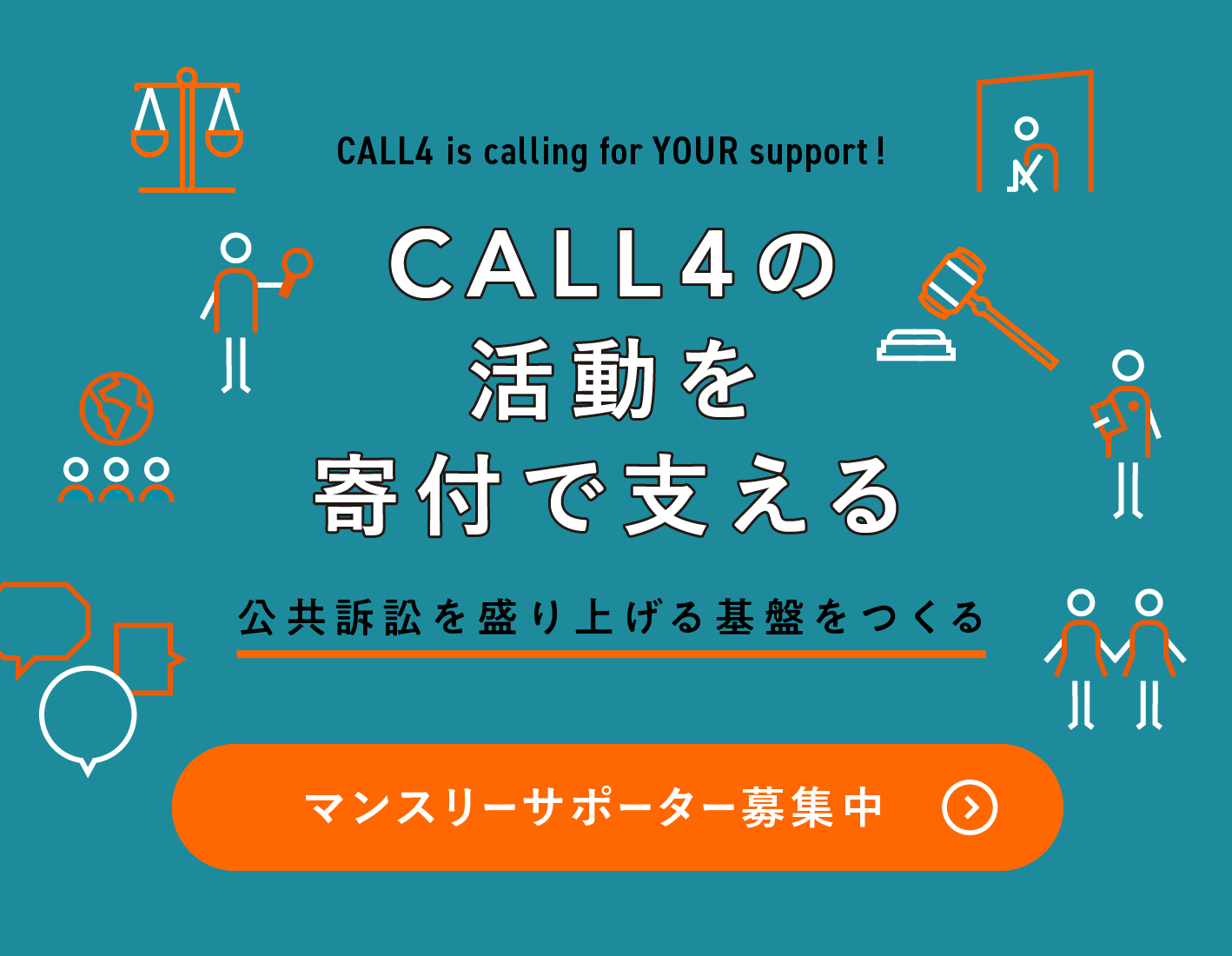「無効のはずの廃園条例、なぜ続く?」— 子どもたちの保育環境を守るための訴訟 "Why does the ordinance to close daycare centers, which should be invalid, continue?" - A lawsuit to protect children's daycare environments
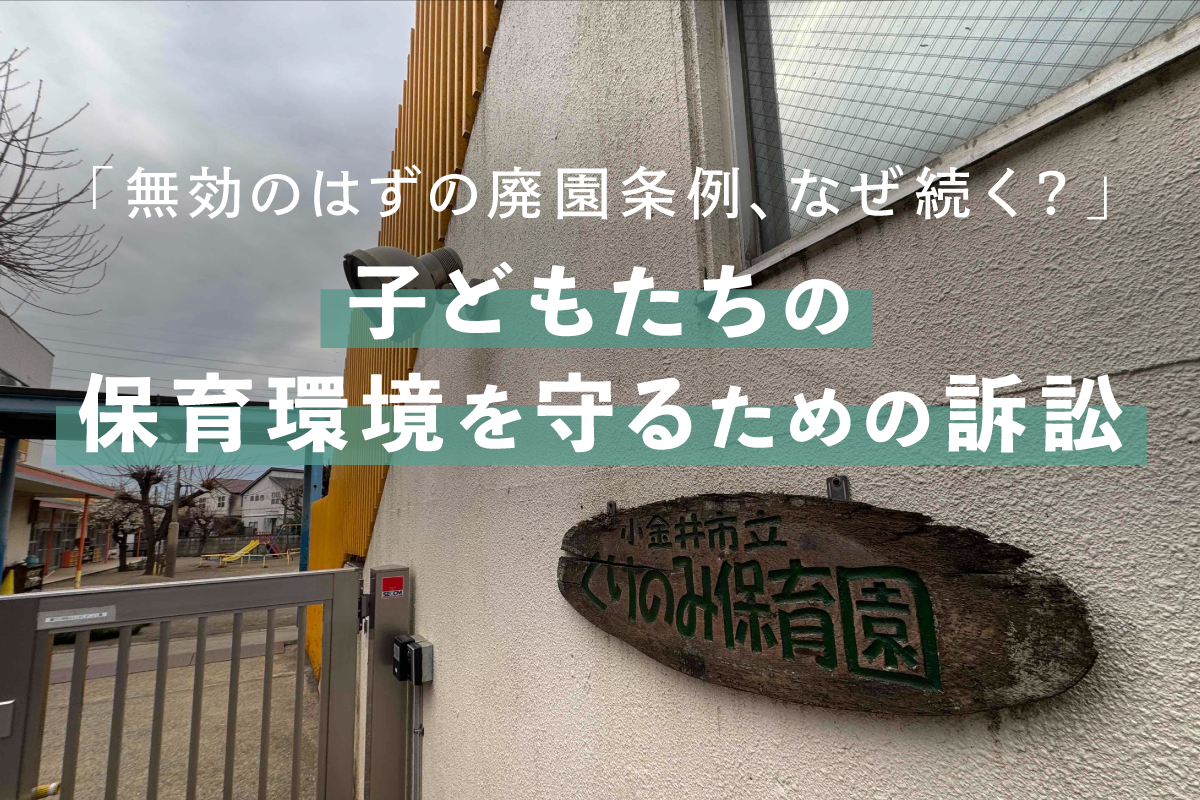
小金井市立保育園2園を段階的に縮小・廃園とする条例は違法で無効であるとの判決が東京地裁で下され、その後確定しました。しかし市は「判決は訴えた原告のみに適用され、原告以外の市民に対しては廃園条例は有効である」として他の児童の入園を認めません。他に同級生が一人もいないなど保育環境が著しく損なわれ、新たに生まれる子を上の子と同じ保育園に通わせられないことなどから損害賠償を求め再度提訴しました。 TBA
はじめに
2022年9月、小金井市の前市長は、専決処分により、市立保育園2園を廃園(0歳児の募集停止)する条例(廃園条例)を制定しました。2024年2月、東京地裁はこの廃園条例が違法な手続で制定されたもので無効であると判断し、原告の子どもの入園を不許可とした市の処分を取り消しました。市は判決を受け入れ控訴せず、確定しました。
しかし、市は「判決は訴えた原告のみに適用され、原告以外の市民に対しては廃園条例は有効である」と主張し、他の児童の入園を認めませんでした。その結果、兄弟で同じ園に通えない、同学年が一人もいないなど保育環境が著しく損なわれています。
この裁判は、小金井市在住の7世帯12名が、市の対応による権利侵害の是正と、安心して子育てできる環境整備を求めて提訴したものです。
東京地裁は「廃園条例は無効」と判断し、市も判決を受け入れました。それなのに、市は今も園児募集を再開せず、保護者や子どもたちの権利を無視し続けています。
このままでは、市民の被害が広がるだけでなく、「裁判で勝っても意味がない」という司法制度への不信にもつながります。無効とされた条例を、市はいつまで執行し続けるのでしょうか?
訴訟の内容
この裁判では、東京都小金井市在住の市民7世帯12名が、小金井市に対して、慰謝料として一人あたり50万円の支払いを求めています。
東京都小金井市では、2022年9月の市議会において、市立保育園2園の段階的廃止を定める条例案について、継続審議という結論になりました。しかし、市長は継続審議とされたはずの2園の廃園条例について、「専決処分」により制定しました。「専決処分」(地方自治法179条1項)とは、議会が本来の機能を発揮し得なくなっている場合に、地方公共団体の長の執行機能を確保するために、例外的に議会の権限に属する事項についての決定権限を長に与えるものです。長が専決処分をした後には議会による承認を得る必要があります(地方自治法179条3項)が、本件では市議会は市長の専決処分を不承認としました。
段階的廃園の対象となった市立保育園に第1子が在園する小金井市民保護者が、第2子を第1子と同じ保育園への入園させようと応募したところ、市は廃園条例を理由に第2子に対して同園への入園不許可処分を行いました。そこで、当該保護者は市に対して廃園条例の取消し、第2子の入園不許可処分取消しと慰謝料の支払いを求めて東京地方裁判所に提訴しました。2024年2月に、市長の専決処分は要件を欠いた違法なものであり、廃園条例は無効であるとして、原告の第2子に対する入園不許可処分の取り消しと、慰謝料請求を認容する原告全面勝訴の判決を言い渡しました。地方自治法179条1項では「議会において議決すべき事件を議決しないとき」に長が専決処分をすることができる旨定められていますが、「議会において議決すべき事件を議決しないとき」とは単に議決を欠く事態が生ずるだけでは足りず、極めて例外的な場合に限られるとされ、本件ではそうした例外的な事情は認められないと判断されたのです。市は判決を重く受け止めるとして控訴せず、この判決は確定しました。
ところが、市は原告以外の市民に対しては条例の効力は否定されていないとの見解に基づき、2024年度も、勝訴した原告以外の市民に対する2園の募集再開を行っていません。そのため、廃園条例の対象となっている2園に子どもの入園を希望する小金井市民6世帯11名が原告となり、2園について募集再開しないことが違法であることに基づく慰謝料の支払いを求め、東京地裁立川支部に提訴しました。
本訴訟の原告らは、上の子と同じ保育園に入園させられないことにより復職が困難になるなど、生活に大きな影響が生じています。原告らは、本訴訟において金銭の支払いを受けることそのものを目的としているのではなく、多くの市民が提訴を通じて違法な現状に対して明確に声を挙げることで、全ての市民に対して募集再開するよう市に迫ることを最大の目的にしています。
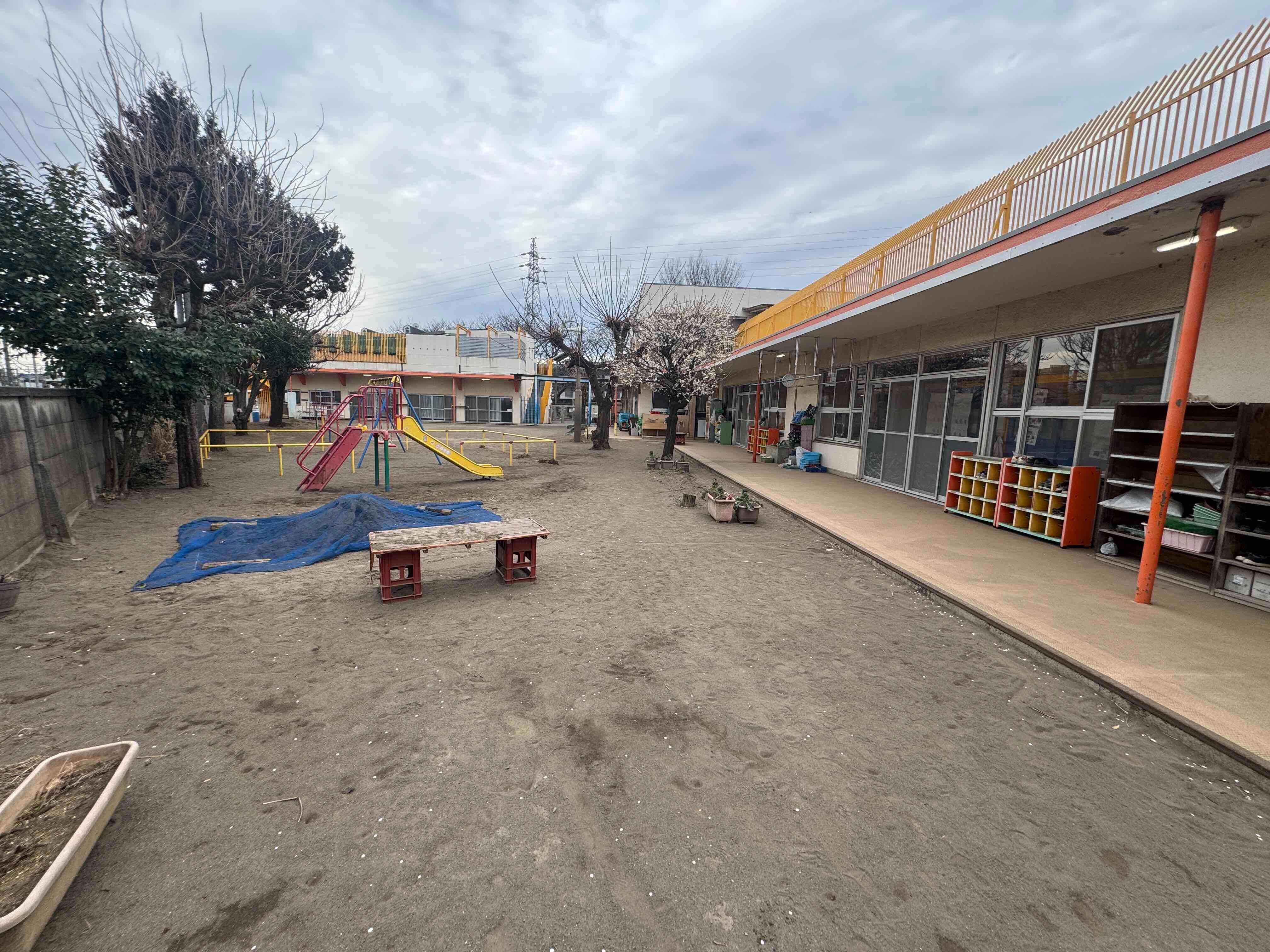
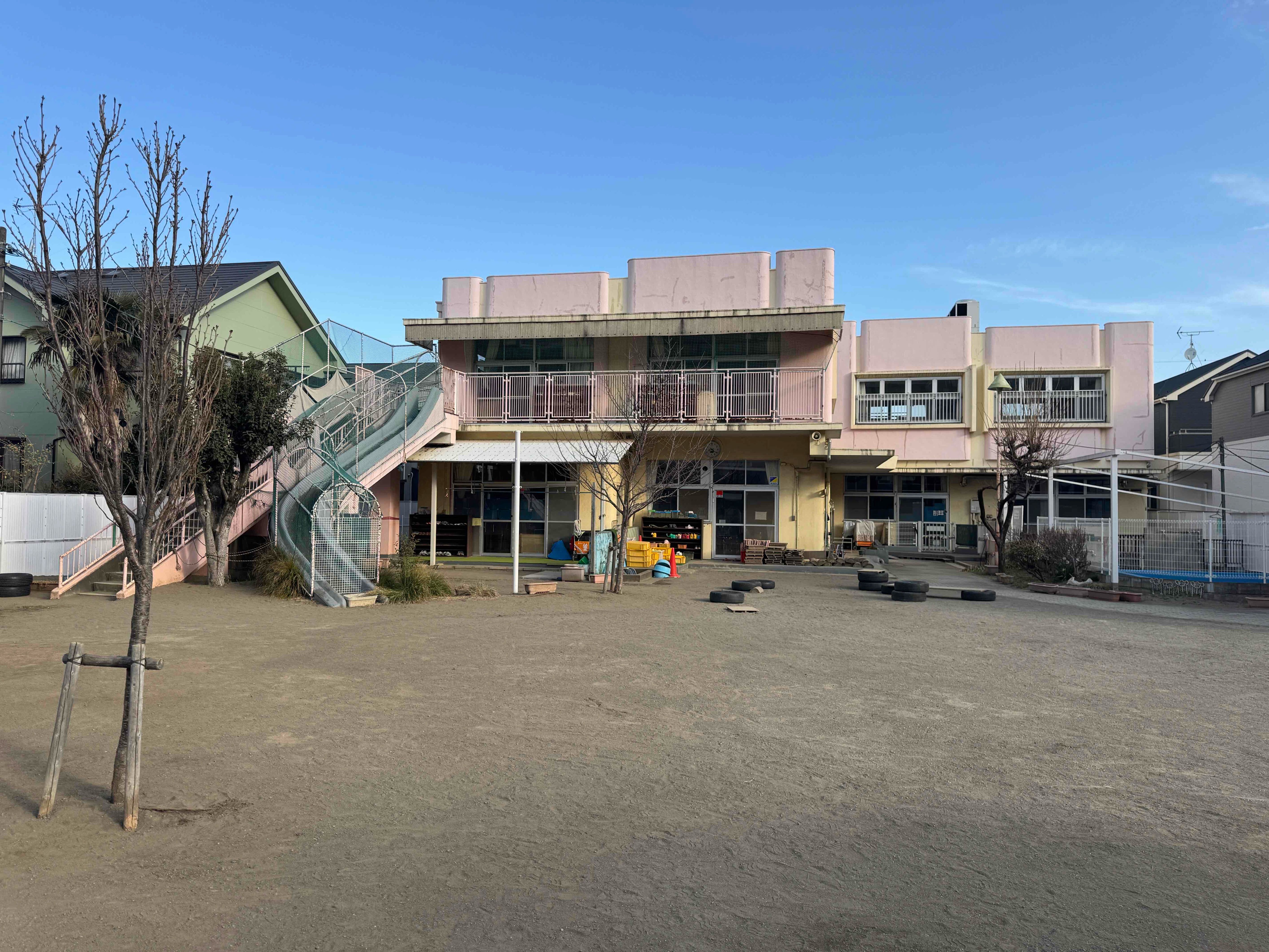
▲廃園条例の対象となった小金井市立くりのみ保育園とさくら保育園
これまでの経緯
今回の提訴までの経緯は以下のとおりです。
| これまでの主要な出来事 | |
|---|---|
| 2021年7月 | 小金井市がくりのみ・さくらの公立保育園2園を段階的縮小・廃園とすることを表明。 |
| 多くの保護者・市民・団体から市や議会に対して意見書や陳情が出される。 パブリックコメントも過去最多でそのほとんどが廃園に反対の意見であった。 | |
| 2022年9月 | 市民の意見を無視し、廃園条例(案)が議会上程。 継続審議の結果は継続審議であったが、西岡市長が専決処分にて廃園条例を制定。 |
| 2022年10月 | 専決処分について市議会に承認を求めたが議会は否決。 西岡前市長が辞任。 |
| 2022年11月 | 白井市長誕生。 公約に廃園条例の撤回及び新たな審議会設置(公立保育園の在り方について白紙の状態から審議)を掲げる。 |
| 2022年12月 | 東京地方裁判所にさくら保育園保護者1人が提訴(前訴)。 |
| 白井市長が廃園条例を廃止する条例案を議会に上程するが、議会は否決 (判決は、このことをもって専決処分に認められる瑕疵は治癒されないと説示)。 | |
| 2024年2月22日 | 東京地裁判決。 入園不許可処分は取り消しされ慰謝料も認められた。 専決処分は違法・廃園条例は無効とされた。 |
| 2024年3月 | 市は議会にて、控訴を行わないことを報告。一方で、0,1歳児の早期の募集再開を否定。 判決により法律上の義務が生じるのは原告のみであり、それ以外の市民には廃園条例は有効でそのまま適用されるとの見解を表明。 市立保育園在り方検討委員会設置条例を提案・議会にて可決。 |
| 原告弁護団が、条例改正をせずとも募集再開を行うことに問題はないことについて、法律意見書を市に提出。 | |
| 公立保育園在り方検討委員会設置条例が可決。 | |
| 市長に原告として初の面会。 入所に向けた取り進めを確認する一方で原告以外の募集再開が無いことから原告は賠償金の受け取りを拒否。 | |
| 多くの保護者・市民・団体から市や議会に対して早期の募集再開に関する意見書や陳情が出状される。 | |
| 2024年9月 | 早稲田大学法学学術院人見教授の法律意見書を市に提出。 |
| 2024年10月 | 廃園条例に基づき公立保育園2園について、2025年度から2歳児も定員を0とする保育所入所募集要項が配布される。 |
| 2024年12月 | 6世帯11名が市に対して新たな裁判を提訴(本訴)。 |
| 2025年2月 | 先の裁判で勝訴判決を勝ち取った原告がこの裁判の原告として加わる(予定)。 |
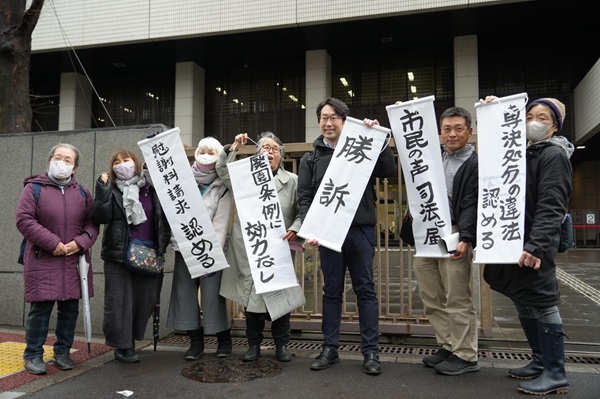
▲2024年2月22日東京地裁判決日の様子
裁判の争点
廃園条例が違法無効であると判示した判決後も原告以外に募集再開していないことは違法か
本訴訟における最大の争点は、廃園条例が違法無効であると判示した判決が確定した後、提訴までの1年弱の間、市が当該裁判の原告以外の市民に対して募集再開していないことが違法であるかどうかです。
小金井市は、市民全員に対して募集再開しない理由について、裁判で条例の効力が否定されたのは原告となっていた市民との関係に限られ、他の市民に対しては現在でも廃園条例は効力を有していることを挙げています。そして、全ての市民に対して募集を再開するには新たに条例の制定手続きが必要であり、具体的な方針については、今後の小金井市の市立保育園のあり方を検討する諮問委員会の答申を踏まえて判断するとしています。
しかし、そもそも条例とは、対象となる住民全員に対して平等に適用されなければならず、「廃園条例は違法・無効」と明示した判決が確定している以上、全ての市民との関係において廃園条例の効力は失われているはずです。原告たちは、提訴までの間、市議会を通じて、市に対し、「全ての市民に対して募集再開するために新たな条例改正手続きは不要であり、募集再開しないことで市立保育園という公の施設の平等利用権が侵害されている」との内容の学者意見(著名な行政法・地方自治法の研究者によるものです)を提出し、速やかに募集再開を求めましたが、市の頑な対応は変わっていません。
市が全ての市民に対して募集再開しないことで、前裁判で勝訴して廃園予定であった市立保育園に入園した当該原告の児童は、現在1歳児クラスで同級生がおらず、一人で保育を受けています。このような保育環境は異常であり、子どもの福祉の観点から直ちに是正されなければなりません。
前裁判の原告との関係でも、全ての市民との関係でも、直ちに全市民に対する募集が再開されなければなりません。そのために、本訴訟において、市が募集再開しないことは違法であることを明確にする必要があります。
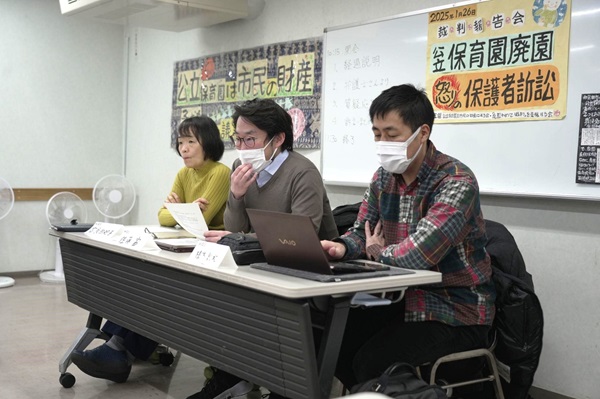
▲2025年12月提訴会見の様子
社会的意義
この裁判の目的として、まずは原告及びその子どもたちが受けている被害を止めることですが、原告は皆自分のためだけに立ち上がったわけではありません。
募集再開を心待ちにしている子どもたちや保護者は多数います。また、経験豊富な保育士や十分な園庭が確保されており、歴史のある公立保育園を廃園にすることに対して反対をしている市民も数多くいます。その方たちの声があるからこそ、今回原告として提訴をすることができました。
なにより、専決処分という違法な手続きによって制定された廃園条例は無効である旨判示した東京地裁判決が確定したにもかかわらず、このまま小金井市で廃園が進んでしまえば、他の自治体に対しても悪しき前例となります。
例えば、公立保育園(あるいは他の公の施設でも)を一方的に専決で処分することを決め、園児や職員を減らして疲弊させた後に、結論ありきで審議会での検討や市民へ説明をするといった手続きを行うことが許されることになってしまいます。
違法で無効な条例との判決が確定したにもかかわらず、判決に従わずに適当な理由をつけて無効な条例を執行し続け、既成事実化した後に、条例改正をすることによって政策を実施する手段を認めてしまうことになれば、裁判所の判決の主旨に反するだけでなく、司法制度すら形骸化させるものになりかねません。
このような対応を許さないためにも、我々はこの裁判を行っています。
資金の使途
- 裁判を行っていくうえでの必要経費(印紙代・郵便切手等)
- 意見書費用
- 弁護士費用
- チラシの作成・配布等広報活動資金
前回の裁判の時は必要経費は支援者や駅頭などでのカンパ、クリアファイルを作成・販売などを通じて、必要経費を何とか賄い、また弁護士費用についても実質支払いができない状況でした。
市民への広報や世論に訴えるとしても、チラシ配布等の作成費用も資金が不足しており、十分な広報活動もできていない状況です。新たな裁判ではこれらの活動にも対応をするため、クラウドファンディングによるみなさまからのご支援が必要です。
原告の思い
現在通っている保育園で、段階的縮小が進む中、先行き不透明な不安、異年齢保育や第2子との2園送迎が叶わず、転園を余儀なくされた家庭があり、今後もそのような家庭があると思います。今はこのまま同じ保育園を卒園したい思いが強いですが、同学年が次々と転園していった場合、我が家も転園を考えざる得ない時がくるのかも…と考えると両親共に不安でなりません。息子は、保育士の先生からも「人見知り、場所見知りが強い子」と言われています。まだ幼く不安定な時期なので、可能な限り急激な場所・人の変化を与えず、落ち着いた環境でのびのびと育てていきたい。それが叶わないこと、子供にどんな影響があるかと考えると、日々不安が募ります。
このような不安を抱えている父母は我々だけではなく、多くの父母が同様の状況あるいは実際に転園や市外に引っ越すなどの被害を受けています。一刻も早く、廃園手続きを止め、募集再開をしていただきたいです。
弁護団からのメッセージ
我々弁護団は、東京地方裁判所の前訴訟でも代理人を務め、横暴ともいえる小金井市長の専決処分を是正すべく尽力し、廃園条例は違法・無効であるとの判決を勝ち取りました。ところが、廃園条例は原告以外の関係ではいまだに有効であるとの解釈を示し、全ての市民に対して募集を再開しない市の対応に愕然としました。
全ての市民が平等に利用の機会を確保されるべき公の施設である市立保育園において、1歳児クラスで同級生がおらず一人だけの保育が続いている現状や、上の子と同じ保育園に入園させることができず復職が困難となったり人生設計が大きく狂ってしまっている原告らの悲痛な想いは、決して見過ごされてはいけないものです。
本訴訟でも、市の対応が違法であることを明確にしたうえで、一刻も早く全市民に対して募集が再開されるように尽力する所存です。
担当弁護士のご紹介
本訴訟は、いずれも東京都立川市所在の三多摩法律事務所に所属する4名の弁護士による弁護団で対応しています。
富永 由紀子(第二東京弁護士会)
植木 則和(第二東京弁護士会)
佐藤 宙(東京弁護士会)
神垣 真歩(第二東京弁護士会)
おわりに
この裁判は、原告の被害に関する国家賠償請求ですが、原告個人の問題だけではありません。
裁判所の判決によって違法・無効となった条例を執行し続けることが違法であることを明確にし、公立保育園を利用している又は利用を希望している子どもたち・保護者の被害を一刻も早く防ぎたい。
廃園条例を無効として取り扱わない市の対応を放置するのは司法の形骸化にもつながりかねず、悪しき前例を全国に広げないためにも皆様のご協力をお願いする次第です。
*Translated by Google Translate
Introduction
In September 2022, the former mayor of Koganei City enacted an ordinance (school closure ordinance) to close two city-run nursery schools (stopping the enrollment of newborns) by special decision. In February 2024, the Tokyo District Court ruled that the closure ordinance was invalid because it was enacted through illegal procedures, and overturned the city's decision to deny admission to the plaintiff's children. The city accepted the ruling and did not appeal, and the ruling became final.
However, the city argued that the ruling only applied to the plaintiffs, and the ordinance to close the school is valid for all citizens other than the plaintiffs, and did not allow other children to attend the school. As a result, the childcare environment has been significantly damaged, with siblings unable to attend the same school and no children in the same grade.
This lawsuit was filed by 12 people from seven households living in Koganei City (one person from one household is scheduled to be merged on February 20th), who are seeking to correct the infringement of their rights caused by the city's response and to create an environment in which they can raise children with peace of mind.
The Tokyo District Court ruled that the ordinance to close the kindergarten was invalid, and the city accepted the ruling. However, the city has not yet resumed accepting new students, and continues to ignore the rights of parents and children.
If things continue as they are, not only will the damage to citizens increase, but it will also lead to distrust in the judicial system, with people thinking, "There's no point in winning in court." How long will the city continue to enforce the ordinance that has been declared invalid?
Summary of the lawsuit
In this lawsuit, 12 people from seven households living in Koganei City, Tokyo, are seeking compensation of 500,000 yen per person from the city.
In Koganei City, Tokyo, the city council decided in September 2022 to continue deliberation on a proposed ordinance to gradually close two city-run nursery schools. However, the mayor enacted the ordinance to close the two schools, which was supposed to be continued deliberation, by "exclusive decision." "Exclusive decision" (Article 179, Paragraph 1 of the Local Autonomy Act) is an exceptional measure that gives the mayor the authority to make decisions on matters that fall under the authority of the assembly in order to ensure the executive function of the head of a local government when the assembly is no longer able to perform its original functions. After the mayor makes an exclusive decision, approval by the assembly is required (Article 179, Paragraph 3 of the Local Autonomy Act), but in this case the city council did not approve the mayor's exclusive decision.
A Koganei citizen whose first child was enrolled in a city-run nursery school that was subject to gradual closure applied to have her second child enrolled in the same nursery school as her first child, but the city refused to allow her second child to attend the same school, citing the closure ordinance. The parent then filed a lawsuit in the Tokyo District Court against the city, seeking the cancellation of the closure ordinance, the cancellation of the denial of admission for the second child, and compensation. In February 2024, the court ruled in favor of the plaintiff, revoking the denial of admission for the plaintiff's second child and granting the plaintiff's claim for compensation, on the grounds that the mayor's arbitrary decision was illegal and lacked the necessary requirements, and the closure ordinance was invalid. Article 179, paragraph 1 of the Local Autonomy Law stipulates that the mayor may make a discretionary decision when "the assembly fails to resolve a matter that should be resolved," but "when the assembly fails to resolve a matter that should be resolved" does not simply mean that a resolution is not reached, but is limited to extremely exceptional cases, and it was determined that no such exceptional circumstances were found in this case. The city took the ruling seriously and did not appeal, and the ruling became final.
However, based on the view that the effectiveness of the ordinance has not been denied for citizens other than the plaintiffs, the city has not reopened the two kindergartens to citizens other than the plaintiffs who won the case, even in fiscal year 2024. As a result, 11 people from six Koganei households who wished to enroll their children in the two kindergartens that are subject to the closure ordinance became plaintiffs and filed a lawsuit in the Tachikawa branch of the Tokyo District Court, seeking compensation on the grounds that the failure to reopen the two kindergartens is illegal.
The plaintiffs in this lawsuit are experiencing significant effects on their lives, including difficulty in returning to work because they cannot enroll their child in the same nursery school as their older child. The plaintiffs' goal in this lawsuit is not to receive payment in itself, but rather to pressure the city to reopen recruitment to all residents by raising their voices against the illegal current situation through the lawsuit from many residents.


▲Koganei City's Kurinomi Nursery School and Sakura Nursery School were subject to the closure ordinance.
Background
The background to this lawsuit is as follows:
| Major events to date | |
|---|---|
| July 2021 | Koganei City has announced that it will gradually downsize and close two public nursery schools, Kurinomi and Sakura. |
| Many parents, citizens, and organizations submit opinions and petitions to the city and the assembly. There were also more public comments than ever before, most of which were in opposition to the closure of the park. | |
| September 2022 | Ignoring the opinions of the citizens, a bill to close the park was submitted to the assembly. The result of the continued deliberation was that the matter would continue, but Mayor Nishioka made a final decision to enact the ordinance to close the park . |
| October 2022 | The city council was asked to approve the special resolution, but it was rejected . Former Mayor Nishioka resigns. |
| November 2022 | Mayor Shirai is born. His campaign promises include the repeal of the ordinance to close daycare centers and the establishment of a new council (to deliberate from a clean slate on the future of public daycare centers). |
| December 2022 | A parent from Sakura Nursery School filed a lawsuit in the Tokyo District Court (previous lawsuit). |
| Mayor Shirai submitted a bill to repeal the park closure ordinance to the city council, but the council rejected it (the ruling stated that this did not cure the flaws in the summary decision). | |
| February 22, 2024 | Tokyo District Court ruling. The denial of admission was overturned and compensation was awarded. The summary decision was ruled illegal and the closure ordinance invalid . |
| March 2024 | The city government reported to the assembly that it would not appeal the ruling . However, it denied the early reopening of admissions for infants aged 0 and 1. The court expressed the view that the ruling only creates legal obligations for the plaintiffs, and that the park closure ordinance is valid and applies as is to all other citizens . A bylaw to establish a committee to consider the future of city nursery schools was proposed and passed by the city council. |
| The plaintiffs' legal team submitted a legal opinion to the city stating that there is no problem with resuming recruitment without amending the ordinance. | |
| An ordinance to establish a committee to review the future of public nursery schools was passed. | |
| This was my first meeting with the mayor as a plaintiff. While confirmation was being made that progress was being made toward admission, the plaintiff refused to accept the compensation because recruitment had not resumed for anyone other than the plaintiff. | |
| Many parents, citizens, and organizations have submitted letters of opinion and petitions to the city and assembly calling for an early resumption of recruitment. | |
| September 2024 | A legal opinion from Professor Hitomi of the Waseda University Faculty of Law was submitted to the city. |
| October 2024 | Based on the ordinance on closure of daycare centers, two public daycare centers will be distributing application guidelines that will set the capacity of daycare centers at zero, even for two-year-olds, from the 2025 academic year. |
| December 2024 | Eleven people from six households have filed a new lawsuit against the city (main lawsuit). |
| February 2025 | The plaintiffs who won the previous trial are expected to join as plaintiffs in this trial. |

▲The Tokyo District Court ruling date on February 22, 2024
Issues at issue
Is it illegal that the park has not resumed accepting applications from anyone other than the plaintiffs even after the court ruling that the park closure ordinance is illegal and invalid?
The main issue in this lawsuit is whether it was illegal for the city to not resume recruitment to residents other than the plaintiffs in the lawsuit for nearly a year after the judgment that found the park closure ordinance illegal and invalid was finalized and until the lawsuit was filed.
Koganei City has stated that the reason it will not reopen the nursery schools to all residents is that the court's denial of the ordinance's validity was limited to the plaintiffs, and that the closure ordinance is still in effect for other residents. In order to reopen the nursery schools to all residents, a new ordinance would be required, and the city will decide on a specific policy based on the report of an advisory committee that is examining the future of Koganei City's nursery schools.
However, ordinances must be applied equally to all affected residents, and since the court ruling clearly stated that the "ordinance for closing nurseries is illegal and invalid," the ordinance should have lost its effect in relation to all citizens. Prior to filing the lawsuit, the plaintiffs submitted a scholarly opinion (written by a well-known researcher in administrative law and local autonomy law) to the city through the city council, stating that "a new ordinance amendment procedure is not necessary to reopen recruitment to all citizens, and the failure to reopen recruitment is violating the right to equal use of a public facility such as a municipal nursery school," and called for a swift reopening of recruitment, but the city's stubborn response has not changed.
The plaintiff's child, who enrolled in a municipal nursery school that was scheduled to close after a previous lawsuit was won due to the city not reopening its applications to all residents, is currently alone in the one-year-old class with no other classmates. This type of nursery environment is abnormal and must be corrected immediately from the perspective of children's welfare.
Recruitment must be resumed immediately for all citizens, both in relation to the plaintiffs in the previous lawsuit and in relation to all citizens. To that end, it is necessary to make it clear in this lawsuit that the city's failure to resume recruitment is illegal.

▲Scene from the lawsuit press conference in December 2025
Social significance
The purpose of this lawsuit is, first and foremost, to stop the harm suffered by the plaintiffs and their children, but the plaintiffs are not standing up just for themselves.
There are many children and parents who are looking forward to the reopening of the school. In addition, there are many citizens who are opposed to the closure of this historic public nursery school, which has experienced childcare workers and a large playground. It is because of these people's voices that we were able to file this lawsuit as plaintiffs.
Above all, despite the Tokyo District Court ruling that the ordinance on school closures, enacted through the illegal procedure of summary decision, is invalid, if school closures in Koganei City continue as they are, it will set a bad precedent for other municipalities.
For example, it would be permissible to unilaterally and arbitrarily decide to dispose of a public nursery school (or any other public facility), reduce the number of children and staff, exhausting them, and then carry out procedures such as holding a council to review the matter and explaining it to the public, with a predetermined conclusion in mind.
If, despite the fact that a ruling that a local ordinance is illegal and invalid has been made final, the government continues to enforce the invalid ordinance by making up suitable excuses rather than complying with the ruling, and after making it a fait accompli, approves the means to implement policies by amending the ordinance, this would not only go against the intent of the court's ruling, but could also render the judicial system meaningless.
We are conducting this lawsuit in order to prevent this kind of behavior from happening.
Use of funds
- Necessary expenses for conducting a trial (stamps, postage, etc.)
- Fee for written opinion
- Attorney's fees
- Funding for PR activities such as creating and distributing flyers
During the last trial, we managed to cover the necessary expenses through donations from supporters and at train stations, and by creating and selling clear files, and we were also unable to actually pay the attorney's fees.
Even if we were to publicize our case to citizens and appeal to public opinion, we are currently lacking funds to distribute flyers and other materials, and are therefore unable to carry out sufficient public relations activities. In order to be able to carry out these activities in the new trial, we need your support through crowdfunding.
Plaintiff’s thoughts
As the current nursery school is gradually shrinking, there are families who are forced to transfer because of the uncertainty of the future, the inability to care for children of different ages, and the inability to take the second child to and from the nursery school. I think there will be more families like this in the future. Right now, I have a strong desire for my child to graduate from the same nursery school, but if the same grade level continues to transfer, we may have to consider transferring to another nursery school... This makes both parents very anxious. My son is said by the nursery school teacher to be "a child who is very shy and afraid of new places." He is still young and unstable, so I want to raise him in a calm environment without giving him sudden changes in places and people as much as possible. When I think about the fact that this will not be possible and the impact it will have on my child, I feel more and more anxious every day.
We are not the only parents with such worries; many parents have been in the same situation or have had to change schools or move out of the city. We would like you to stop the procedures for closing the school and resume accepting applications as soon as possible.
Message from the Lawyers
Our legal team also represented the plaintiffs in a previous lawsuit at the Tokyo District Court, where we worked hard to correct the tyrannical decision of the Mayor of Koganei and won a ruling that the park closure ordinance was illegal and invalid. However, we were shocked by the city's response, which was that the park closure ordinance was still valid in relation to parties other than the plaintiffs, and that it would not reopen the park to all residents.
The current situation in which a municipal nursery school is a public facility that should be available to all citizens equally, with no other children in the one-year-old class and only one child in care, and the painful feelings of the plaintiffs who are unable to enroll their older children in the same nursery school, making it difficult for them to return to work and causing major disruptions to their life plans, must never be overlooked.
In this lawsuit, we intend to make it clear that the city's response is illegal, and to do our utmost to ensure that recruitment is resumed for all residents as soon as possible.
Introducing our lawyers
This lawsuit is being handled by a legal team of four lawyers from the Santama Law Office, located in Tachikawa, Tokyo.
Yukiko Tominaga (Second Tokyo Bar Association)
Norikazu Ueki (Tokyo Bar Association)
Sora Sato (Tokyo Bar Association)
Maho Kamigaki (Tokyo Bar Association)
Conclusion
This lawsuit is a claim for state compensation for the damage suffered by the plaintiffs, but it is not just an issue for the plaintiffs as individuals.
We want to make it clear that continuing to enforce the ordinance that has been declared illegal and invalid by a court ruling is illegal, and prevent harm to children and parents who use or wish to use public daycare centers as soon as possible.
If we ignore the city's refusal to treat the park closure ordinance as invalid, it could lead to the judicial system becoming a mere formality, so we ask for your cooperation in preventing this bad precedent from spreading across the country.
あなたにおすすめのケース Recommended case for you
- 外国にルーツを持つ人々 Immigrants/Refugees/Foreign residents in Japan
- ジェンダー・セクシュアリティ Gender/Sexuality
- 医療・福祉・障がい Healthcare/Welfare/Disability
- 働き方 Labor Rights
- 刑事司法 Criminal Justice
- 公正な手続 Procedural Justice
- 情報公開 Information Disclosure
- 政治参加・表現の自由 Democracy/Freedom of Expression
- 環境・災害 Environment/Natural Disasters
- 沖縄 Okinawa
- 個人情報・プライバシー Personal information/Privacy
- アーカイブ Archive
- 全てのケース ALL
